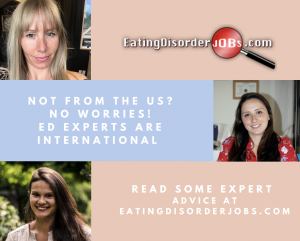Let’s not forget about the experts who are widely known in our field but live or work in other countries.

“Imposter Syndrome is very real. It is always good to balance that out with reminding yourself what you know and what you don’t while making sure to stick within your scope of practice. One of the things that has helped me the most is attending webinars, reading books, and just getting my hands on any ED-related material I can. This field is challenging and yet so rewarding. Always keep in mind the nature of eating disorders … Progress in recovery usually has nothing to do with you as a clinician. Sometimes it’s good to remind yourself of that!” – Clair El-Jor MSc, LD (Lebanon)
“If a student wants to get into this area I think you need to be prepared to do a lot of work. Including self work. I have listened to 100s of podcasts, read articles, joined ED FB groups to read and listen to sufferers to understand perspectives on treatment models. You need to learn skills that you don’t get in your RD degree. Working in a team with parents, partners, GP, psychologists – and most of the time you will know more than the rest of the team. You will become skilled in the medical, pharmacology, psychology, nutrition, therapy, exercise and genetics because it’s all so related to the food. You will be versed in the guidelines in all areas to help guide the rest of the treatment team with best practice. And you will be so passionate about it you won’t even care that you don’t get paid for 90% of the work you do.” – Victoria Schonwald RD (New Zealand)
“Be gentle with yourself. I know for myself the drive can be strong to want to fix everyone and take their pain away, and this can create intense and unrealistic pressure on myself (and them!). Focus on what you can control and on being the most caring, authentic, competent provider you can be, and then know that this is also everyone’s own journey. Find ways of loving the work for the connections it allows you to make with amazing individuals and for how neat it is to be able to be a part of their journeys, whatever path it takes.”- Sarah Rzemieniak (Canada)
“ I began working with provincial and national athletes through the Sport Medicine and Science Council Manitoba and then the Royal Winnipeg Ballet. I decided I needed to be part of a larger networking group and became a member and shortly after co-chaired the Dietitians of Canada Sport Nutrition Network. I started to attend conferences such as SCAN, ASCM, Eating Disorders in Sport Conference etc. With continuing education such as the International Olympic Committee Diploma in Sports Nutrition and networking and openness to mentorship, I landed my current full time position with the Canadian Sport Centre Manitoba (CSCM). My work in sport opened my eyes and my heart to the world of dysfunctional eating behaviors and that not one “type” of sport or athlete or human is immune.”- Jorie Janzen CSSD (Canada)
“My best advice to someone new in the field is to build a community of likeminded peers that share your values for the work you do. So much of our clinical work is rooted in developing expertise and learning new ways to treat clients and different modalities, that the learning process can be incredibly isolating. Start with what brings you meaning and value first, and you will never lose sight of your purpose. Bring others along with you who share your visions and work together on making it happen.”– Meghan Watson M.A. RP (Canada)
Check out these experts’ full interviews at https://eatingdisorderjobs.com/category/advice-from-experts/ and search the right column for their name.
